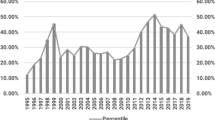Abstract
Niche parties have been increasingly successful during the last 30 years and have accordingly received a lot of scholarly attention. So far most of the focus has been on Green and radical right parties, and to a more limited extent, regional parties. In this paper I analyze the electoral fates and policy outcomes of another type of niche party, namely those focusing on anti-corruption, whose successes culminated during the 2000s. The study is limited to all new parties campaigning on the issue of anti-corruption in Central and Eastern Europe since the fall of the Berlin wall and the questions to be answered are: To what extent are these parties successful in obtaining relevant positions in the government so that they are able to effectively fight corruption? What impact do they have on anti-corruption measures, thereby influencing the level of corruption? How successful are these parties in the elections that follow? In short, to what extent do anticorruption parties matter? Apart from electoral and governmental data, the analysis is based on the Freedom House Nation in Transit annual reports, in which one section deals with the efforts to curb corruption. The results are rather mixed, but indicate that the more influential positions the anti-corruption parties (ACPs) have in government, the better are their anti-corruption performances. That implies that they are serious and competent enough to tackle those issues, despite their newness and lack of experience. Not surprisingly, the incumbent ACPs fare worse than those in opposition in subsequent elections, but quite a few still remain popular. Finally, all but one party abandoned their anti-corruption rhetoric in their second election, which implies that anti-corruption is a different type of issue, compared to the ones used by previous niche parties.
Similar content being viewed by others
References
Bennich-Björkman, Li, Bågenholm, A., Johansson Heinö, A. (2012). Civilizing Politics: A New Road to Electoral Success. Elite Strategies and the Emergence of New Political Parties in Post-communist Europe. Manuscript under review.
Bågenholm, A. (2009). Politicizing Corruption. The Electoral Impact of Anti-Corruption Discourse in Europe 1983–2007. QoG Working Paper Series 2009, 10. Quality of Government Institute, University of Gothenburg.
Bågenholm, A. (2010). Politicizing Corruption. The Electoral Effects of Anti-Corruption Rhetoric in Europe 1983–2007. Paper presented at the 2010 Annual meeting of the American Political Science Association, September 2–5, 2010.
de Lange, Sarah L. (2008). From Pariah to Power: The Government Participation of Radical Right-Wing Populist Parties in West European Democracies. University of Antwerp.
Dimock, M. A., Jacobson, G. C. (1995). Checks and Choices: The House Bank Scandal’s Impact on Voters in 1992. Journal of Politics 57, No. 4.
Drummond, A. J. (2006). Electoral Volatility and Party Decline in Western Democracies: 1970–1995. Political Studies 54, 628–647.
Green, J. (2007). When Voters and Parties Agree: Valence Issues and Party Competition. Political Studies 55, 629–655.
Hug, S. (2001). Altering Party Systems. Strategic Behavior and the Emergence of New Political Parties in Western Democracies. Ann Arbor: University of Michigan Press.
Kosiara-Pedersen, K. (2012). The 2012 Danish Parliamentary Election: A Very New Government. West European Politics 35, 415–424.
Lane, Jan-Erik, Ersson, S. O. (1994). Politics and Society in Western Europe. London: Sage.
Lipset, S. M., Rokkan, S. (Eds.) (1967). Cleavage Structures, Party Systems, and Voter Alignments: An Introduction. In S.M. Lipset, S. Rokkan (Eds.). Party Systems and Voter Alignments: Cross-National Perspectives. New York: The Free Press.
Mair, P., Müller, W. C., Plasser, F. (2004). Introduction: Electoral Challenges and Party Responses”. In P. Mair (Ed.). Political Parties and Electoral Change: Party Responses to Electoral Markets). London: Sage.
Meguid, B. (2008). Party Competition between Unequals: Strategies and Electoral Fortunes in Western Europe. Cambridge: Cambridge University Press.
Miller, B., Meyer, T. (2011). To the Core of the Niche Party: Conceptual Clarity and Valid Measurement for a Much Employed Concept. Unpublished manuscript.
Minkenberg, M. (2001). The Radical Right in Public Office: Agenda-Setting and Policy Effects. West European Politics 24, 1–21.
Müller-Rommel, F. et al. (2004). Party Government in Central Eastern European Democracies: A Data Collection (1990–2003). European Journal of Political Research 43, 869–893.
Nation in Transit. Country Reports 2003–2010. Freedom House (www.freedomhouse.org).
Pennings, P., Lane, Jan-Erik (1998). Introduction. In P. Pennings, Jan-Erik Lane (Eds.). Comparing Party System Change. London & New York: Routledge.
Persson, A., Rothstein, Bo, Teorell, J. (forthcoming in Governance). Why Anti-Corruption Reforms Fail — Systemic Corruption as a Collective Action Problem.
Peters, J. G., Welch, S. (1980). The Effects of Charges of Corruption on Voting Behavior in Congressional Elections. The American Political Science Review 74, No. 3.
Pogunkte, T. (2002). Green Parties in National Government from Protest to Acquiescence? In F. Müller-Rommel, T. Pogunkte (Eds.). Green Parties in National Governments. London: Frank Cass.
Pop-Eleches, G. (2010). Throwing out the Bums. Protest Voting and Unorthodox Parties after Communism. World Politics 62, 221–260.
Rihoux, B., Rüdig, W. (2006). Analyzing Greens in Power: Setting the Agenda. European Journal of Political Research 45, 1–33.
Rothstein, Bo (2011). The Quality of Government. Chicago & London: The University of Chicago Press.
Sikk, A. (2011). Newness as a Winning Formula for New Political Parties. Party Politics, published online 21 March 2011. Transparency International (www.transparency.org)
Wagner, M. (2011). Defining and Measuring Niche Parties. Party Politics, published online 18 May 2011.
Welch, S., Hibbing, J. R. (1997). The Effects of Charges of Corruption on Voting Behavior in Congressional Elections, 1982–1990. The Journal of Politics 59, No. 1.
Woldendorp, Jaap et al. (1998). Party Government in 20 Democracies: an update (1990–1995). European Journal of Political Research 33, 125–164.
Yearbook 1999–2010 European Journal of Political Research.
Author information
Authors and Affiliations
Corresponding author
About this article
Cite this article
Bågenholm, A. The electoral fate and policy impact of “anti-corruption parties” in Central and Eastern Europe. Humaff 23, 174–195 (2013). https://doi.org/10.2478/s13374-013-0118-4
Published:
Issue Date:
DOI: https://doi.org/10.2478/s13374-013-0118-4




